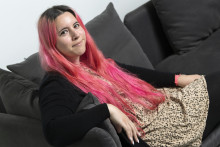‘I’m working on the HEROES (Home-based ExeRgaming fOr Enhancing resistance to falls after Stroke) project, designing and developing a videogame for rehabilitation of stroke patients. It’s a serious game used for balance recovery. I’m co-creating the game with patients, physiotherapists and experts on stroke rehabilitation, to get to know the full context and create something for them, with them. There is a huge number of people in the Netherlands who have suffered a stroke. Healthcare costs for recovery after a stroke are quite high. Having a system that patients could use at home would save some of these costs, and it would also allow people to exercise whenever they like. Just thinking of the pandemic, it's easy to imagine situations in which you can’t leave your home. That shouldn’t mean that you have to stop your rehabilitation. I’m now busy with creating the prototype of the game. It will feature a raft in the ocean that you have to control with your body and move from one harbour to another. It should be a calming environment, because we have to think of the patients first.
Aurora Ruiz Rodríguez
PhD research topic: Exergames and balance rehabilitation
Works at: Biomechanical Engineering group, the Faculty of Engineering Technology
Studied: Computer Science (Centro de Investigación Científica y de Educación Superior de Ensenada, Mexico)
Originally from: Mexico
I have always liked working with vulnerable groups. During my Bachelor studies, I worked on a project with blind people. For my Master’s, I developed a videogame for children with autism. After that I knew I wanted to work on serious games for my PhD research as well. I’ve always enjoyed videogames. I’m the little sister and my brother always played videogames while I watched. I became a gamer myself when I was older. Not to sound cheesy, but finding this project was therefore a dream come true.’

‘I’m also passionate about helping and promoting women in science. I studied engineering and I noticed that I didn’t have many female classmates. There were mostly boys in the classroom and almost all the professors were male. I realized there weren’t many women in the field in general. I was a good student, but people somehow thought that engineering was only for boys and they let me feel it. I was doing well, but they assumed I wouldn’t. And I noticed the same patterns during my Master’s studies. Mostly boys, no female teachers and so on. So I started searching for groups involved in this topic. I started volunteering for an organisation that supported girls from low income backgrounds to pursue studies in STEM fields. I also still volunteer for Women who Code, focused mostly on women in their Bachelor studies. I mentor students and help with the organization. And here at the UT I co-founded the P-NUT group EQUITY dedicated to supporting female doctoral candidates and providing equal opportunities for everyone.
With everything I do, I want to improve things, improve someone’s life. Being there for someone as a mentor can provide true support and change the patterns.’
‘I come from Mexico and I always liked the idea of studying abroad. Even though I came here during the pandemic in 2020, it wasn’t difficult to move here. There was chaos everywhere in the world, but I could still come and do what I loved, so from the start it was just nice to be here. I feel good here. The project and all my colleagues are really nice. There is also a good Mexican community at the UT. It’s good to have people to talk to and exchange experiences.
'I have always liked working with vulnerable groups'
So far doing a PhD is even nicer than I imagined. I have friends who did PhD and they were always really stressed, but I’m feeling a lot more relaxed than I did during my Master. Of course there is stress sometimes, but overall it is way better than I pictured it would be. It might also be thanks to my supervisor, who is really great. If I want to work late, he reminds me that I should not do that, that I should go out and have fun. He is very concerned with the wellbeing of his students. I’m a person who thinks too much and tends to stress, but here I have a lot of facilities to help me relax. It could also be personal growth, of course. Maybe I learnt how to relax. During my Master’s I worked a lot and I was under a lot of stress, but now I know that my health is important and that you have to balance your work, your life and everything else. It is very difficult, but it is possible.’








